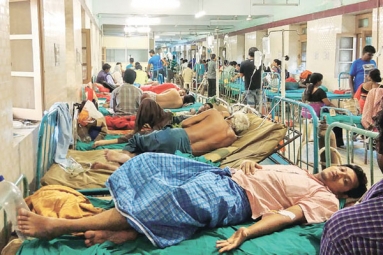
(Image source from: Canva.com)
As the monsoon rains move through the nation, hospitals are experiencing an increase in fever cases, but distinguishing between them has become difficult. The rise in both viral and dengue fevers is causing confusion among patients because their symptoms are similar, which often leads to delays in getting the right diagnosis and treatment. Dengue fever is transmitted by the Aedes aegypti mosquito, while viral fever is caused by common viruses like rhinovirus and influenza virus, which can be spread through sneezing, coughing, or touching contaminated surfaces. Even though both are infections caused by viruses, they are spread by different sources, with dengue being significantly more serious. She mentioned that getting treatment for dengue quickly is essential, as delays could lead to death.
Dengue often brings a sudden, very high fever, unlike viral fever, which usually develops gradually. Viral fever generally goes away in 2-3 days, but dengue can make the patient’s health worse over time. Dengue is known for causing severe body aches, often called break bone fever because of the intense pain in bones and muscles. Other signs include pain behind the eyes, swollen joints, and fatigue. In contrast, viral fever typically comes with milder body aches, headaches, and a sore throat. A major sign of dengue is the appearance of skin rashes, which are not common with viral fever. People who notice red rashes along with a fever should quickly seek medical help. To diagnose dengue, doctors use tests such as the NS1 antigen test, dengue antibody test, and platelet count test. Dengue leads to a quick decrease in platelets, while viral fever does not greatly impact blood tests, though there can be minor changes in white blood cells.
There isn’t a specific antiviral treatment for dengue; rather, care focuses on managing the symptoms. Simple paracetamol is often recommended for viral fever, which usually clears up rapidly. However, dengue might require hospitalization, particularly if the symptoms include vomiting, abdominal pain, weakness, bleeding, or skin rashes accompanied by high fever. Quick diagnosis and treatment of dengue are crucial to avoid serious complications. A viral fever that lasts longer than 3-4 days should also be checked by a doctor.















